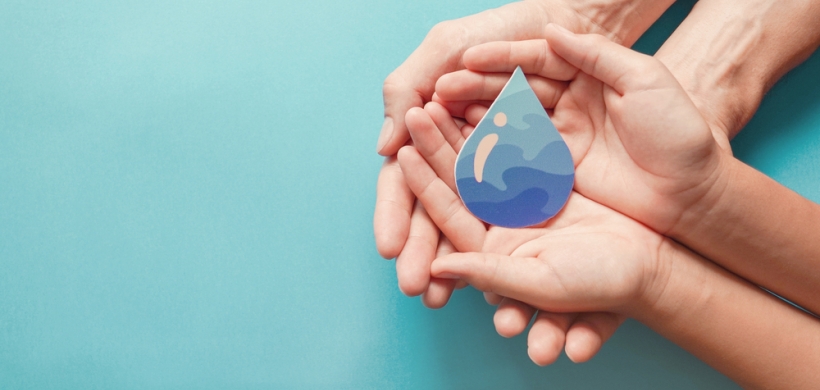At LiveWest we are Creating Greener Futures Together. That’s why each month we are sharing some green advice to help you build on your sustainable living habits.
This month we are focusing on saving water, which can be harder during the hot summer months.
Why should I be actively saving water?
Although our planet is covered in water, 97.5% of this water is locked in seas and oceans, too salty for human use. And most of the remaining 2.5% is in the ice caps. This means that we depend on a tiny amount of fresh water, in rivers, lakes and reservoirs, to produce everything that we need to survive.
Climate change is making it harder to get fresh water. Even in rainy England, there could be water shortages by 2050 if we don't start saving water now.
That’s why every drop counts towards saving our future on this planet.
Will I be saving money by saving water?
If you have a water meter, absolutely!
Even if you do not have a meter, using water wisely and cutting down on the amount of hot water you use will lower your gas and electricity bills.
1. Save Water in the Shower
A shower uses about 10 liters of water every minute. If a family of four takes 1 minute less in the shower every day, they can save up to 11,648 liters of water a year, saving around £45 on water bills and £52 on energy bills.
Using a low-flow showerhead also helps save water. Visit the Save Water Save Money website for free water-saving products.
2. Reuse Water
Collect water from rinsing fruits, vegetables, and dishes to water plants. In summer, reuse paddling pool water for your garden.
3. Save Water When Flushing the Toilet
Use cistern displacement devices to reduce water use when flushing. These bags save 1 to 2 liters of water per flush. Dual flush toilets also help by offering a lower flush option.
For free water-saving products, visit the Save Water Save Money website.
4. Get a Water Butt
Water butts collect rainwater for watering plants, saving about 900 liters an hour compared to using a hose. Always use a watering can with your water butt to avoid spreading Legionella bacteria.
Clean your water butt annually and keep it cool.
Water your plants in the evening and check the weather forecast to avoid unnecessary watering.
Visit our Gardening page for more tips.
5. Reduce Food Waste
Food production uses a lot of water. By planning meals and only buying what you need, you can reduce food waste. Eating less meat and dairy and more local vegetables also saves water.
For more tips, check out the Slow Cook, Low Waste recipe booklet and our green cooking advice page.
6. Wait for a Full Load of Laundry
Washing machines use about 50 liters of water per cycle. Wait until you have a full load before washing to save water. This also applies to dishwashers.
7. Run Your Dishwasher When It’s Full
Dishwashers use 10 liters of water per cycle. Only run it when full to save water and reduce your energy bill. This saves more water than washing dishes by hand.
8. Steam Your Vegetables
Steaming vegetables saves water and is healthier than boiling. If you boil vegetables, use the leftover water for soups, stocks, or to water plants.
Visit our green cooking advice page for more tips.
9. Wash Your Car with a Bucket
Using a bucket and sponge to wash your car instead of a hose saves water.
Visit Save Water Save Money for a guide on washing your car efficiently.
10. Keep a Jug of Water in the Fridge
Instead of running the tap until the water is cold, keep a jug of water in the fridge. This saves water and is handy on hot days!
For more information, watch the video below.
You may be following all of these tips already and are still struggling to pay your water bill. There is no shame in reaching out for support with your bills if you need it.
Your water company may be able to help you if you are struggling to pay. Many water companies also offer free water saving devices. We have some more information on our Free Water Saving Device page.
